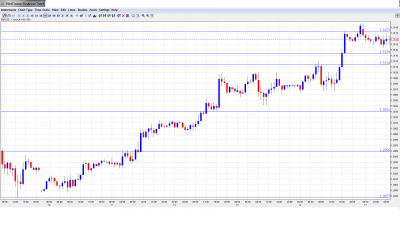EUR/USD begins the new trading week at a three-month high following an impressive rally last week. Market sentiment brightened after Eurozone finance ministers agreed, after weeks of difficult negotiations, to release the second installment of bailout funds to Greece. The euro was also buoyed by Federal Reserve’s announcement that it would implement another round of quantitative easing (QE4), and purchase an additional 45 billion dollars per month in Treasury holdings in order to boost the US economy. There are only a few releases to begin the new trading week. so Mario Draghi’s speech will set the tone.
EUR/USD Technical
- Asian session: Euro/dollar was quiet, as the pair consolidated at around 1.3160. The pair is unchanged in the European session.
- Current range: 1.3130 to 1.3170.
Further levels in both directions:
- Below: 1.3130, 1.3110, 1.3030, 1.2960, 1.2880, 1.28, 1.2750, 1.2690, 1.2624, 1.2590, 1.25, 1.2440, 1.2390 and 1.2250.
- Above: 1.3170, 1.3290, 1.34, 1.3480 and 1.36.
- 1.3170 is providing weak resistance. 1.3290 is stronger.
- 1.3130 is the next line on the downside.
Euro/dollar steady following rally – click on the graph to enlarge.
EUR/USD Fundamentals
- 9:00 Italian Trade Balance. Exp. +0.25B. Actual +2.45B.
- 10:00 Euro-zone Trade Balance. Exp. +10.8B.. Actual +7.9B.
- 13:30 US Empire State Manufacturing Index. Exp. -0.7 points.
- 14:00 US TIC Long-term Purchases. Exp. 24.3B.
- 14:30 ECB President Mario Draghi addresses the Committee on Economic and Monetary Affairs in Brussels.
- 16:00 US FOMC Member Jeremy Stein Speaks.
- 18:00 US FOMC Member Jeffrey Lacker Speaks.
For more events and lines, see the Euro to dollar forecast
EUR/USD Sentiment
- Eurogroup releases next installment Greek aid: Late last week, the Eurogroup approved the release of the second installment of the Greek bailout, following the successful completion of the Greek government’s debt buyback program. The EFSF will release a total amount of 49. 1 billion euros, which will be paid out in several installments. Greece will receive 34.3 billion in the first tranche, and the remaining funds by March 2013. The buyback program and the flow of more aid are important milestones in putting Greece’s financial house back in order. If the agreement on Greece’s debt goes according to plan, the country’s debt to GDP ratio is expected to improve dramatically, falling to 124 per cent by 2020.
- Federal Reserve Announces Q4: The Federal Reserve announced that it would implement QE4, a further round of monetary easing. The Fed is hoping that this step will bolster the US economy, which is recovering more slowly than expected. Under Q4, the Fed will purchase 45 billion dollars per month in Treasury holdings. This is in addition to the $40 billion that the Fed has been buying in mortgage backed securities under Q3. Operation Twist, in which the Fed swapped short-term Treasuries for longer term U.S. government debt, will be phased out at the end of December. The currency markets reacted quickly after Q4, and the news helped the euro post a solid rally last week against the dollar.
- ECB to supervise Eurozone banks: European finance ministers reached a deal in Brussels last week, whereby the ECB will become the single supervisor for the 200 largest banks in the Eurozone. The move aims to achieve closer financial integration and help protect the euro from future financial crises, which have rocked the Eurozone. Under the agreement, struggling banks would be able to receive emergency funds directly from the ESM. If all goes smoothly, the ECB will begin its new role as a “super bank commissioner” by January 2014. There have also been discussions of widening the ECB’s supervisory powers to cover EU banks which are not located in the Euro-zone.
- Eurozone economies struggling: As we approach the end of 2012, the health of the economies of the major players in the zone does not look promising. Unemployment is rampant in Greece and Spain, and Italy and France are also experiencing high unemployment. With these major economies facing small or even negative growth, there may not be a lot to cheer about in the early part of 2013. On the brighter side, there has been progress in the Greek debt crisis, as aid is again flowing to Athens. As well, a framework has been agreed upon concerning a greater supervisory role for the ECB, with the goal of minimizing the impact of future banking crises in the Euro-zone.
- Republicans sweeten fiscal cliff offer: Republican House Speaker John Boehner has made the Democrats a more flexible offer, but the gridlock over the fiscal cliff shows no sign in letting up. The Republicans have retreated on their demand not to raise taxes, but want a hike to only affect those earning more than $1 million. The Democrats are insisting on tax hikes over those earning over $250,000. The negotiations are continuing, and in the end, some compromise or stop-gap measure is likely to be reached before the end of the year.

